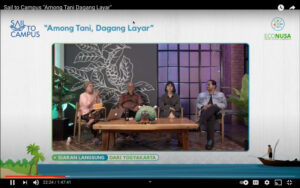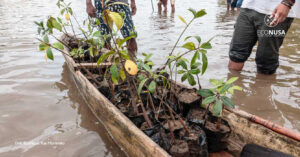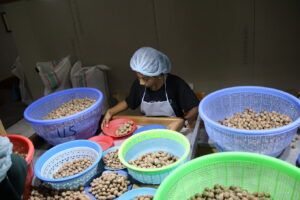
Young people are identical with unbounded creativity. Youngsters born in information technology era are open-minded and technology-savvy in nature to the latest information and technology. Statistics Indonesia (BPS) data in 2018 show that young populations of 16-30 years of age account for 68.82 million or 24.51 percent of the total populations. Tanah Papua and Maluku Islands alone have 1.8 million young populations.
The number of young populations and their attachment to information and technology advancement has given very prominent opportunities and roles in the forest and sea ecosystem conservation endeavor. Their potentials could be dig out so as to become an agent of change that communicates effectively for the environmental preservation. They can promote culture multiplicity and biodiversity in Indonesia including those in Tanah Papua and Maluku Island.
In Eastern Indonesia, there are many kinds of threat to nature due particularly to forest and land use change into industrial areas, illegal logging, mining and development activities. Forest Watch Indonesia recorded that in 2009-2013 Tanah Papua has lost its 490,000 hectares of forested areas. Land clearance in Tanah Papua is on the top three following Riau in Sumatera and Central Kalimantan.
It is necessary to have youngsters’ participation to articulate conservation of nature and ecology while preventing the natural destruction in Eastern Indonesia. Common public perception on Eastern Indonesia with its remoteness, conflict-prone areas with underprivileged people should be clarified through positive chronicles.
For the reason, EcoNusa Foundation presented a School of Eco Diplomacy (SED) as a capacity building program for Indonesian youngsters in environmental leadership. The training program is designed with some levels. Elementary class is proposed for urban youth or 16-25 years of age in Tanah Papua and Maluku Island, Intermediate class for all young people across Indonesia of 18-30 years, and Advance class for young professionals of 25-35 years old. SED targets to create an urban youth networks in Indonesia, particularly in Tanah Papua and Maluku Island, who have concerns about environmental issues.
They are expectedly to originate youth actions for environmental conservation while generating young profiles with factual contribution to save the Eastern Indonesia ecology. Their positive chronicles are expected to shift the perspective of indigenous community and outside society to the life and natural richness of Eastern Indonesia into better standpoints.
Read also: Involving Youth to Natural Resources Management in Kaimana
Intermediate SED Class
This year, EcoNusa plans to organize virtual training for the Intermediate SED class. The training will select 30 participants to get mentoring and capacity building from various experts and practitioners majoring in environment, public communication and project management. The training theme will be focused on climate crisis, zero deforestation, sustainable forest management, and debris-free ocean.
Unlike the previous SED activities, the Intermediate SED class now will be held virtually due to the rampant Covid-19 pandemic. Transforming offline-designed activities into online is not a trouble-free effort. It is a challenging job to make virtual training and mentoring interesting, effective and benefiting all as expected.
Read also: Action for Young Activists for the Land of Papua
Co-Creation Workshop of Intermediate SED
To get an adequate formula in delivering materials of virtual Intermediate SED class to the participants, EcoNusa’s Public and Youth Mobilization team collaborated with young people in Greater Jakarta to design a training curriculum and timeline through a so-called Co-Creation Workshop of Intermediate SED held in The Hermitage Jakarta on 3 September 2020. The activity was conducted under the rigid health protocol due to the pandemic.
There were 15 youngsters from the Greater Jakarta that were divided into some groups to discuss a method for making an interesting long-distance learning. Doing this way, participants will not be bored, while tuning in the virtual training with viable technology application. Facilitated by EcoNusa team and its partner, Digdaya Selaras, each group created a prototype module for long-distance training which is creative and practicable to the participants of Intermediate SED class.

Involving young people in training curriculum design is expectedly to generate a more suitable material during the Intermediate SED training which is aligned to youth perspective and connected to the youth in such a modern world.
“Co-creation method is very interesting in developing SED program as it provides access to young people to engage in training model design as to their expectation. It is aligned with the behavior and habit of young people targeted in the training,” said Rina Kusuma, the EcoNusa’s Manager for Public and Youth Mobilization Program.
Registration for the Intermediate SED class has been open since July 2020. Up through to 11 September 2020, 135 youngsters have registered for the training and as from the figures will be shortlisted into 30. The shortlisted participant is announced on 30 September 2020. Training will be commenced on 17 October to end of November 2020 and mentoring will be carried out from January to May 2021.
Reviewed by: Rina Kusuma, Manager of Program Public and Youth Mobilization Econusa Foundation
Editor: Leo Wahyudi







